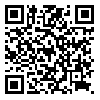BibTeX | RIS | EndNote | Medlars | ProCite | Reference Manager | RefWorks
Send citation to:
URL: http://jdisabilstud.org/article-1-2428-en.html
Background & Objectives: Anxiety is among the most prevalent preschool psychological disorders that can disrupt socio-cognitive development. Anxiety adversely impacts academic, cognitive, emotional, communicative, and social functions. Mathematics is among the major academic courses which require math skills. Social skills are defined as a set of purposeful, observable, and learnable behaviors that include cooperation, assertiveness, self-control, responsibility, self-management, empathy, and sympathy. An optimal manner of teaching preschoolers is applying educational games. The game motivates children to learn without pressure. Educational games include coherent and organized concepts. In educational games, the learner is active, makes decisions, solves problems, and reacts to others' behaviors. Considering the limited effect of educational games on learning math concepts and social skills on preschoolers, the present research aimed to investigate the effect of educational games on learning math concepts and social skills in anxious preschoolers.
Methods: This was a quasi-experimental study with a pretest-posttest and control group. The research population included anxious preschoolers in district 1 of Mashhad City, Iran, in 2018-2019. Considering the study's inclusion criteria, 30 eligible volunteers entered the study by the purposive sampling method and were assigned into two groups by the simple random method using lottery (n=15/group). The inclusion criteria included the age of 5-6 years, obtaining a minimum score of 35 in the anxiety preschoolers scale, not receiving psychological services in the preceding 6 months and no history of receiving educational games. The exclusion criteria included absence from >2 sessions, the lack of active participation, and withdrawal from continuing cooperation. The experimental group participated in ten 45-minute sessions two times a week. Sessions included training by researcher-made educational games; however, the control group received no training. The content validity of training sessions was confirmed by the Delphi method and 15 experts of educational sciences of Mashhad Branch, Islamic Azad University. These 5 core skills were trained in the sessions: reading numbers one to nine, skills of zero understanding, the skill of improving understanding of one-digit numbers, the skill of sorting numbers, and skill of understanding less, more and equal, and each axis was practiced in two sessions. The intervention was performed by a preschool teacher in a preschool center in district 1 of Mashhad City, Iran. The required data were collected using the Anxiety Preschooler Scale (Spence et al., 2001), Social Skills Questionnaire (Gresham & Elliott, 1990), and Teacher-made Math Concepts Test. The collected data were analyzed by descriptive and inferential statistics in SPSS at a significance level of 0.05. Central tendency and scatter indices were used to describe the distribution of variables at the level of descriptive statistics. At the level of inferential statistics, Chi-square and Independent Samples t-tests and univariate Analysis of Covariance (ANCOVA) were used to test the statistical hypotheses.
Results: The Independent Samples t-test data revealed no significant difference between the study groups in the pretest scores of learning math concepts (p=0.734) and social skills (p=0.378); however, the posttest results revealed significant differences between the study groups concerning learning math concepts (p<0.001) and social skills (p=0.003). The univariate ANCOVA results indicated that educational games significantly increased the capacity of learning math concepts (p<0.001) and social skills (p<0.001) in anxious preschoolers. According to the effect size, 78% of these changes in learning math concepts and 88% in social skills were induced by our intervention.
Conclusion: According to the present study results, educational games play an effective role in increasing the capacity of learning math concepts and social skills. Therefore, teachers can use educational games to improve anxious preschoolers' cognitive and social characteristics, especially learning math concepts and social skills.
| Rights and permissions | |
 |
This work is licensed under a Creative Commons Attribution-NonCommercial 4.0 International License. |



